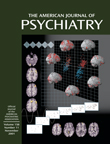To the Editor: Tardive dyskinesia is a serious and potentially debilitating problem for patients treated with conventional antipsychotics. The general treatment guideline for tardive dyskinesia is to change from treatment with conventional to atypical antipsychotics after a patient fails to response to a decreased dose of conventional antipsychotics. Chouinard
(1) found that 6 mg/day of risperidone had a beneficial effect on tardive dyskinesia in a double-blind 8-week trial. But we know of no long-term follow-up studies regarding the severity of tardive dyskinesia after patients are shifted from treatment with conventional antipsychotics to risperidone.
Ten male patients, who met DSM-IV criteria for schizophrenia and research diagnostic criteria by Schooler and Kane
(2) for tardive dyskinesia, were enrolled in our study. The subjects provided their written informed consent to participate. Their original conventional antipsychotics and antiparkinsonian drugs were tapered within 1 week of their entry into the study. Risperidone was prescribed at 2 mg/day and gradually increased to 8 mg/day within 4 weeks. The optimal dose of risperidone was adjusted to maintain the least severity of tardive dyskinesia. The severity of tardive dyskinesia was evaluated with the Abnormal Involuntary Movement Scale (AIMS)
(3) at weeks 1, 2, 3, 4, 6, 8, 10, 12, 24, 36, and 52 of follow-up. All ratings were performed in the afternoon by two senior psychiatrists (J.-Y.C. and C.-C.L.). The patients whose final AIMS scores decreased by more than 4 points were defined as responders, and those whose scores decreased less than 4 points were deemed nonresponders. One patient dropped out because of a physical illness.
The final result showed that there were five responders (55.6%) and four nonresponders (44.4%). The mean final risperidone dose for all nine patients was 6.7 mg/day. The five patients who improved got their maximum effect at a dose of 6.0 mg/day. There was no significant difference in baseline AIMS scores for the responders and nonresponders (mean=13.4, SD=3.8, versus mean=11.7, SD=0.4, respectively). At the endpoint the mean change in AIMS score was 7.0 (SD=2.7) for the responders and 0.5 (SD=0.5) for the nonresponders.
Some tardive dyskinesia is reversible and may spontaneously disappear after withdrawal of neuroleptics, but in the 40-week follow-up study by Glazer et al.
(4) complete remission was rare (2%). The severity of dyskinesia decreased in only 20% of the patients who stopped taking neuroleptics, and the rate of a relapse into psychosis approached 50%. Neuroleptic withdrawal is risky, with a high rate of psychosis exacerbation. All of our patients maintained a stable condition, and five patients had substantial improvement of tardive dyskinesia. As far as we know, this is the first 1-year follow-up case series regarding the use of risperidone with patients with tardive dyskinesia. The antidyskinetic effect of risperidone should be confirmed with a double-blind, controlled trial in a larger study group.

